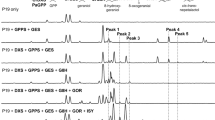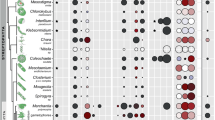Abstract
THE amounts of secondary metabolites accumulated by in vitro cultures of plant cells have generally been disappointingly small and attempts to transform exogenous substrates by cultures of plant cells have not hitherto been much more successful1.
This is a preview of subscription content, access via your institution
Access options
Subscribe to this journal
Receive 51 print issues and online access
$199.00 per year
only $3.90 per issue
Buy this article
- Purchase on Springer Link
- Instant access to full article PDF
Prices may be subject to local taxes which are calculated during checkout
Similar content being viewed by others
References
For a review see Carew, D. P., and Staba, E. J., Lloydia, 28, 1 (1965).
Bennett, R. D., and Heftmann, E., Science, 149, 652 (1965).
Johnson, D. F., Waters, J. A., and Bennett, R. D., Arch. Biophys., 108, 282 (1964).
Caspi, E., Lewis, D. O., Piatak, D. M., Thimann, K. V., and Winter, A., Experientia, 22, 506 (1966).
Bennett, R. D., and Heftmann, E., Phytochem., 6, 747 (1966) and references therein.
Tscheshe, R., Bull. Soc. Chim., 1219 (1965) and references therein.
Author information
Authors and Affiliations
Rights and permissions
About this article
Cite this article
GRAVES, J., SMITH, W. Transformation of Pregnenolone and Progesterone by Cultured Plant Cells. Nature 214, 1248–1249 (1967). https://doi.org/10.1038/2141248a0
Received:
Revised:
Issue Date:
DOI: https://doi.org/10.1038/2141248a0
Comments
By submitting a comment you agree to abide by our Terms and Community Guidelines. If you find something abusive or that does not comply with our terms or guidelines please flag it as inappropriate.



